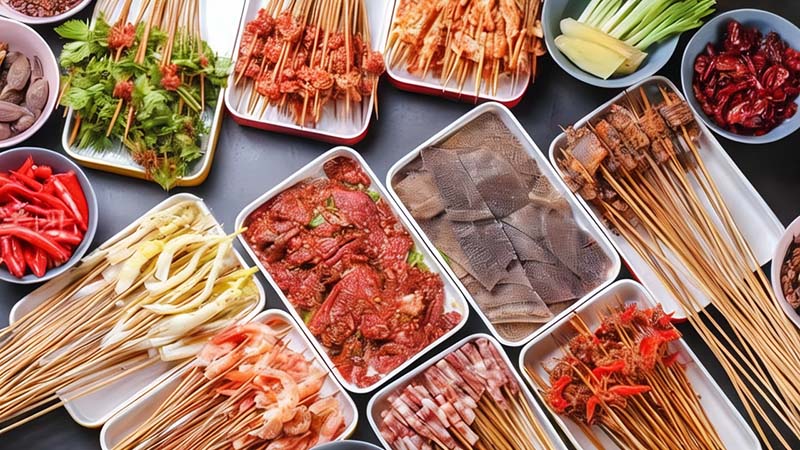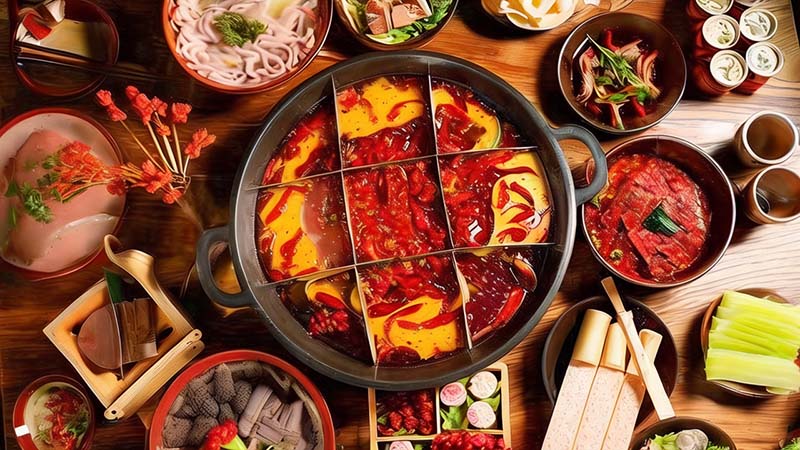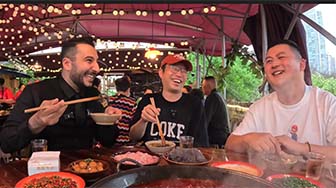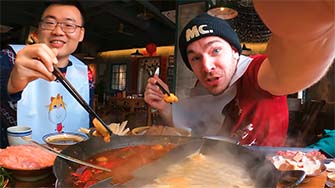Chongqing Hot Pot Guide: Local Flavor & Must-Tries
Introduction
Chongqing hotpot originated on the Yangtze River banks in the early 20th century. Dock workers cooked cheaper offal and scraps in a broth of chili and Sichuan pepper. Over time, this developed into the distinctive Chongqing hotpot.
The estimated number of hotpot restaurants in Chongqing is around 30,000. Chongqing residents' love for hotpot knows no season; even in the scorching summer, the allure of hotpot remains undiminished.
In addition, it has become a manifestation of social activities. Whether it's family gatherings, dinners with friends, or business banquets, hotpot is always among the top choices.
Must-Know
Overview
A hotpot meal usually lasts 1-4 hours. In the cooking process, ingredients are individually prepared in broth, requiring time to achieve optimal texture and flavor, with some needing precise cooking durations. Also the diverse hotpot ingredient range requires time for selection, prep, and tasting.
Above all, it is a social dining style where friends and family eat together at a shared table. It is typically enjoyed by ; eating it solo might seem a bit unusual.
The per person cost is generally between €7.6 to €12.6. Most restaurants operate from noon until midnight, with some staying open as late as 2 a.m.
Diversity
The diversity of Chongqing hotpot is reflected in its numerous variations, categorized into "old-school hotpot," "skewered hotpot," and other types of hotpot.
- (Old-School Hot Pot): The traditional Chongqing hotpot, characterized by a base of beef tallow, Sichuan peppercorns, dried chili peppers, and other spices.
- (Skewered Hot Pot): It offers a more convenient dining format, where ingredients are threaded onto bamboo skewers.

Broth Choice
When you step into a hotpot restaurant, the very first thing you'll be asked is what kind of broth you'd like your hotpot to be – it’s the crucial starting point for any hotpot dining experience.
| Level | Spiciness | Suitability |
|---|---|---|
| (Clear Broth) | Non-spicy 🥬 | Disregarded |
| (Dual Hot Pot) | Divided Clear & Spicy Broth | Recommended for First Try |
| (Spicy Broth) | Spicy 🌶️ | Recommended, Locals Favorite |

Hotpot is one of the most famous spicy dishes in China, particularly in the regions of Chongqing and Sichuan. However, to say that hotpot is the spiciest food in China might be somewhat exaggerated, as it depends on individual preferences for spiciness and the level of spiciness in the hotpot base chosen.
In Chongqing hotpot, Sichuan pepper is used extensively to create a unique numbing sensation, which complements the heat from the chilies. The combination of the numbing effect from the Sichuan pepper and the spiciness from the chilies is what gives Chongqing hotpot its distinctive "ma la" flavor.
Spiciness Choice
If you choose spicy broth, you'll be asked is how spicy you'd prefer.
| Level | Spiciness | Suitability |
|---|---|---|
| (Slight Spicy) | 🌶️🌶️ | Recommended, Locals Favorite |
| (Mild Spicy) | 🌶️🌶️🌶️ | Recommended, Locals Favorite |
| (Medium Spicy) | 🌶️🌶️🌶️🌶️ | Locals Only |
| (Extra Spicy) | 🌶️🌶️🌶️🌶️🌶️ | Locals Only |
LOCAL TIPS
Don't put freshly cooked ingredients straight into your mouth; use a dip.
Dipping Sauce
In most of hotpot restaurant, the oil dip is typically self-service. This might explain why foreigners often don't know how to use an oil dipping dish. However, you can always ask a server for help if needed.
| Sauce | Spiciness1 | Suitability |
|---|---|---|
| (Garlic Chili Oil Dip) | Mitigating Spiciness | Strongly Recommended |
| (Vegetable Oil Dip) | Spicy 🌶️🌶️ | Locals Only |
| (Dry Oil Dip) | Spicy 🌶️🌶️🌶️🌶️🌶️ | Locals Only |
- Spiciness1: The influence of the oil dip on the spiciness of the red broth.
Garlic Chili Oil Dip
The classic dipping sauce in Chongqing hotpot culture, which includes sesame oil and garlic, can be referred to as "(Garlic Chili Oil Dip)". It plays several key roles, notably in:
- Cooling Down: It helps to reduce the surface temperature of the hotpot ingredients.
- Mitigating Spiciness: It can temper the spiciness of the food, allowing even those sensitive to heat to better enjoy their hotpot experience.
- Enhancing Flavor: It adds an extra layer of flavor to the hotpot ingredients.
- Protect Gastrointestinal: It helps reduce negative effects linked to eating spicy foods.
Vegetable Oil Dip
The hidden specialty oil dip, typically not readily available and only obtainable by asking a server. Similar to the garlic sesame oil dip, but made with vegetable oil instead. It has a distinctive flavor. Unlike some dips, it does not mitigate spiciness and can be extremely hot when consumed.
Dry Chili Dip
The dry version, known as "(dry oil dip)", primarily consists of chili powder, crushed peanuts, sesame seeds, and other dry seasonings. Blazingly spicy.
Essential Picks
Here are some popular ingredients that are essential to the Chongqing hotpot experience:
Dessert
| Pick | Ingredient | Flavor |
|---|---|---|
| (Ice Tofu Pudding) | Iced Glutinous Rice Balls | Sweet |
| (Ice Jelly) | Iced Carrageenan with Brown Sugar Water | Sweet |
| Pick | Ingredient | Effect |
|---|---|---|
| (Viee TSoymilk) | Soymilk | Mitigating Spiciness |
| (Cooling Tea) | Cooling Herbal Tea | Mitigating Spiciness |
Snacks
| Pick | Ingredient | Flavor |
|---|---|---|
| (Crispy Pork) | Sliced Fried Pork | Non-spicy |
| (Red Sugar Glutinous Rice Cake) | Glutinous rice | Sweet |
Staples
In the context of a hotpot feast, plain white rice, fried rice with egg, and pickled vegetables each play distinctive roles and contribute different flavors:
- (White Rice): The blandness of rice enhances the flavors of hotpot ingredients, acting as a perfect foil to the bold tastes.
- (Fried Rice with Egg): Egg-fried rice, with its golden hue and rich texture, complements a hotpot meal splendidly. The combination of egg aroma and rice creates an additional layer of flavor.
- (Pickled Vegetables): Such as sour cabbage or kimchi, with their tangy profile, help cut through the fattiness of hotpot dishes, providing a refreshing contrast.
Ingredients
Tips
Some ingredients, such as luncheon meat, shrimp dumplings, and sausages, do not explicitly indicate pork content in their names. If you are concerned, please inform the server before ordering — 'nothing with pork or pork lard, please.'
Must-Try Ingredients
| Pick | Broth1 | Blanch Time2 | Spiciness3 |
|---|---|---|---|
| (Beef Tripe) | Spicy | 10s | 🌶️ |
| (Duck Intestine) | Spicy | 15s | 🌶️ |
| (Goose Intestine) | Spicy | 15s | 🌶️ |
| (Tender Beef Slices) | Both | 1min | 🌶️ |
| (Spicy Beef Slices) | Spicy | 1min | 🌶️🌶️🌶️🌶️ |
| (Cow's Gullet) | Both | 2min | 🌶️ |
| (Potato Slices) | Both | 1-4min | 🌶️ |
| (Leatherjacket) | Both | 3-5min | 🌶️ |
| (Lotus Root Slices) | Both | >1min | 🌶️ |
| (Sweet Potato Noodles) | Both | 5min | 🌶️🌶️ |
| (Cold Pot Duck Blood Cube) | Both | 10-15min | 🌶️ |
LOCAL TIPS
Cold pot duck blood needs to be placed in the pot before lighting the fire; this is the difference between cold pot duck blood and regular duck blood. Make sure you inform the server that you want cold pot duck blood when ordering.
- Broth-Friendly1: the "Both" means The ingredient can be cooked in both clear broth and spicy broth, but it is generally more delicious when cooked in the spicy broth.
- Blanch Time2: the blanching time is generally derived from experiential assessment, and it specifically refers to the duration of cooking by quickly immersing the ingredients in the boiling hotpot broth. Actual cooking times may vary and should be adjusted according to personal preference and the specific conditions of the hotpot.
- Spiciness3: referring to the spiciness after being cooked in the spicy Broth.
More Ingredients
| Pick | Broth< | Spiciness |
|---|---|---|
| (Snowflake Beef) | Both | 🌶️🌶️ |
| (Shrimp Paste) | Both | 🌶️ |
| (Young Kelp) | Both | 🌶️🌶️🌶️ |
| (Rehydrated Squid) | Both | 🌶️ |
| (Rocket Squid) | Both | 🌶️ |
| (Loach) | Both | 🌶️ |
| (Pork Brain) | Spicy | 🌶️ |
| (Quail Eggs) | Both | 🌶️ |
| (Enoki Mushrooms) | Both | 🌶️🌶️ |
| (King Oyster Mushrooms) | Both | 🌶️🌶️ |
| (Mushrooms) | Both | 🌶️🌶️ |
| (Tofu Skin) | Both | 🌶️🌶️ |
| (Firm Tofu) | Both | 🌶️🌶️ |
| (Maling Brand Luncheon Meat) | Both | 🌶️🌶️ |
| (Beef Liver) | Spicy | 🌶️🌶️🌶️🌶️ |
| (Eel Segments) | Spicy | 🌶️ |
Please note that the array of ingredients for hotpot is exceedingly diverse. Ranging from meats, seafood, vegetables, bean products, noodles to various specialty snacks, hotpot menus encompass hundreds to even thousands of distinct options. Different hotpot restaurants offer varying selections of dishes, with some establishments featuring signature specialties unique to their menu.
Eat Like a Local
Finding the Best Restaurant
Don't judge a restaurant by its surroundings; good restaurants are typically found on the street rather than in malls.
The best restaurants are often recognizable by the aroma of hotpot that greets you even before you enter; they are usually bustling with activity, filled with diners, and sometimes there's even a queue to get in.
Blanching Sequence
When everything is ready, you can start by adding some hardier ingredients (in an amount that can be finished after cooking), and then start with meat items such as tripe, duck intestines, and fatty beef slices. By the time the tripe and duck intestines have been eaten, the ingredients cooked earlier should also be just about ready.
Using the Dip
Don't put the freshly cooked ingredients straight into your mouth; you can instead transfer a good amount of food onto your bowl, allowing the dipping sauce to reduce their temperature and spice level; or you could use this time to have another couple of slices of tripe.
Using the Tool
You can ask the server for an extra pair of chopsticks to use as serving (chopsticks), specifically for handling raw meats and such; a (skimmer ladle) is a handy tool that can help you locate and retrieve the ingredients you want from the pot.
Spiciness Increases Over Time
It's common for the spiciness to increase as you eat more in a hotpot, especially if you've chosen a Sichuan peppery base. The spiciness builds up over time because the capsaicin in the chili peppers gradually releases and accumulates in the broth.
Desserts should be consumed during the meal, and having drinks and desserts can help alleviate the spiciness.
LOCAL TIPS
As the hotpot gets spicier with each serving, you can add '(aged vinegar)' to your oil dip at opportune moments to further ease the spiciness. Vinegar also has the effect of protecting your digestive system.
Ask the Waitstaff
The people of Chongqing are friendly and generous, always ready to help, even in the cold rain. Use gestures if they might not understand English.



